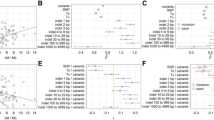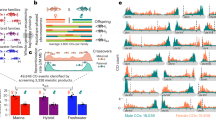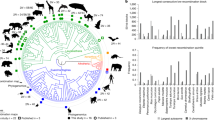Abstract
One of the most influential observations in molecular evolution has been a strong association between regional recombination rate and amount of nucleotide polymorphism in those genomic regions, interpreted as evidence for ubiquitous natural selection. The alternative explanation, that recombination is mutagenic, has been rejected by the absence of a similar association between regional recombination rate and nucleotide divergence between species. However, many recent studies show that recombination rates are often very different even in closely related species, questioning whether an association between recombination rate and divergence between species has been tested satisfactorily. To circumvent this problem, we directly surveyed recombination across approximately 43% of the D. pseudoobscura physical genome in two separate recombination maps, and 31.3% of the D. miranda physical genome, and we identified both global and local differences in recombination rate between these two closely related species. Using only regions with conserved recombination rates between and within species and accounting for multiple covariates, our data support the conclusion that recombination is positively related to diversity because recombination modulates hitchhiking in the genome. Finally, our data show that diversity around nonsynonymous substitutions is recovered at closer distances in areas of higher recombination than in areas of lower recombination — empirically demonstrating that recombination rate can limit the size and severity of potential selective sweeps.
Similar content being viewed by others
Article PDF
Author information
Authors and Affiliations
Corresponding author
Rights and permissions
About this article
Cite this article
McGaugh, S., Smukowski , C., Manzano-Winkler, B. et al. Recombination modulates how selection affects linked sites in Drosophila. Nat Prec (2012). https://doi.org/10.1038/npre.2012.7005.1
Received:
Accepted:
Published:
DOI: https://doi.org/10.1038/npre.2012.7005.1



